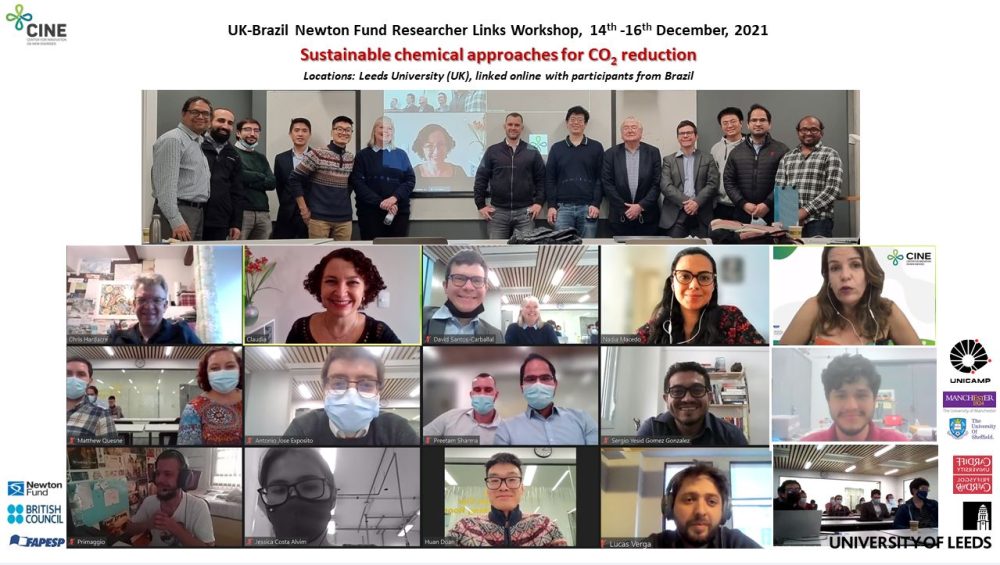UK-Brazil Newton Fund Researcher Links Workshop on Sustainable Chemical Approaches for CO2 Reduction

Prof Peter Styring (University of Sheffield), Dr Preetam Sharma (Loughborough University), and Dr Bhavin Siritanaratkul (University of Liverpool) participated in a Newton fund Researcher Links Workshop on Sustainable Chemical Approaches for CO2 Reduction. The workshop was hosted at Leeds University between 14th-16th Dec 2021 by Prof Nora H. de Leeuw and Dr David Santos-Carballal. Originally intended as an on-site workshop in Brazil to promote collaborations, the workshop was held in a hybrid manner due to uncertainties of travel amidst the Covid-19 pandemic. The UK participants, around 20 early career researchers, gathered in Leeds and were linked online to the participants in Brazil.
Prof Styring delivered a keynote talk on the big-picture view of CO2 utilization, and the necessity of Techno-Economic Analysis and Life-Cycle Assessments in evaluating potential technologies. He also emphasised the need of fiscal interventions and whole-system approach for the accelerated development and commercialisation of the field. Dr Siritanaratkul presented work on an enzyme cascade for CO2 reduction, coupled to electrochemical cofactor regeneration, which was conducted during his DPhil with Prof Fraser A. Armstrong. Dr Sharma presented his ongoing work on electrochemical CO2 reduction to generate multi-carbon production using nanoengineered Cu cathodes. The work is being performed under the UKRI Centre for Circular Chemical Economy with Prof Eileen Yu.
Speakers spanned a broad range of expertise, including computational chemistry, electrochemistry, materials, photochemistry, and chemical engineering. Dr Hossein Yadegari (Imperial College) covered alternative anode reactions (e.g. glycerol oxidation) that could replace water oxidation in CO2 electrolyzers, leading to lower overall cell voltages as well as an additional valuable product from the anode side. Prof. Christopher Hardacre (Manchester University) presented a keynote on superbasic ionic liquids as CO2 absorbers, their competitive adsorption with other common contaminant gases, and direct reduction of CO2-bound ionic liquids.
Dr. Stephen McCord (Sheffield University) talked about integrated assessment of economic and environmental impacts of various CO2 utilization processes. Prof. Claudia Longo (Campinas) presented a keynote on Cu2O-based photoelectrodes synthesized on a gas-diffusion electrode design for light-driven CO2 reduction. The importance of the gas diffusion electrode engineering by addition of porous components and tuning the hydrophobicity for enhanced ethylene production was discussed by Dr Samuel Perry (Southampton University). In addition, there were multiple presentations focusing on the utilisation of in-situ techniques and computational methods for getting insights on CO2 reduction on catalysts’ surfaces.
There was a focus on career development, funding opportunities and international collaborations for the early career researchers. Overall, the workshop provided a fantastic opportunity to network with several researchers in UK and Brazil who are working on (photo)electrochemical CO2 utilisation.